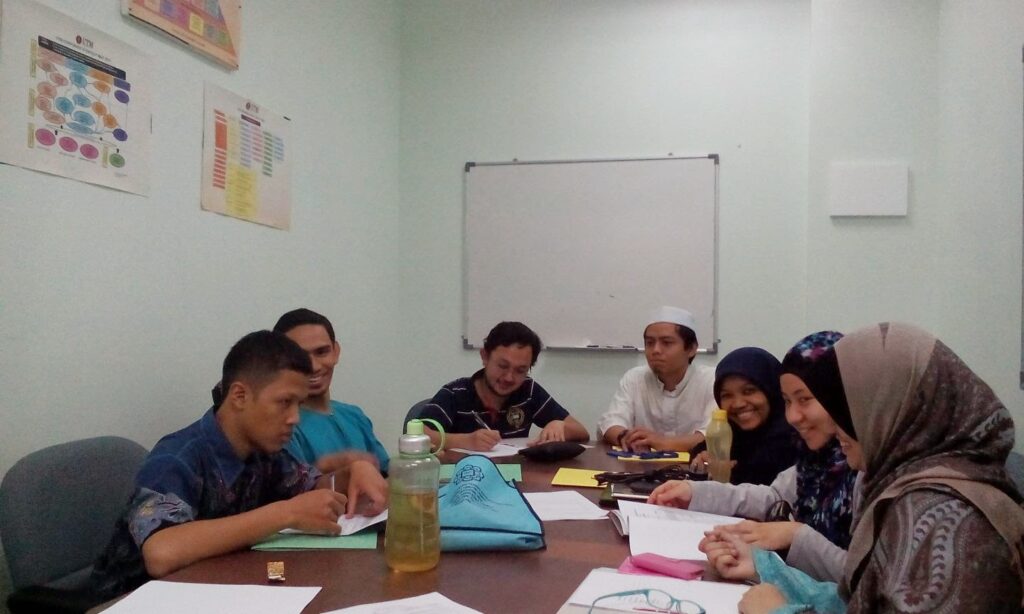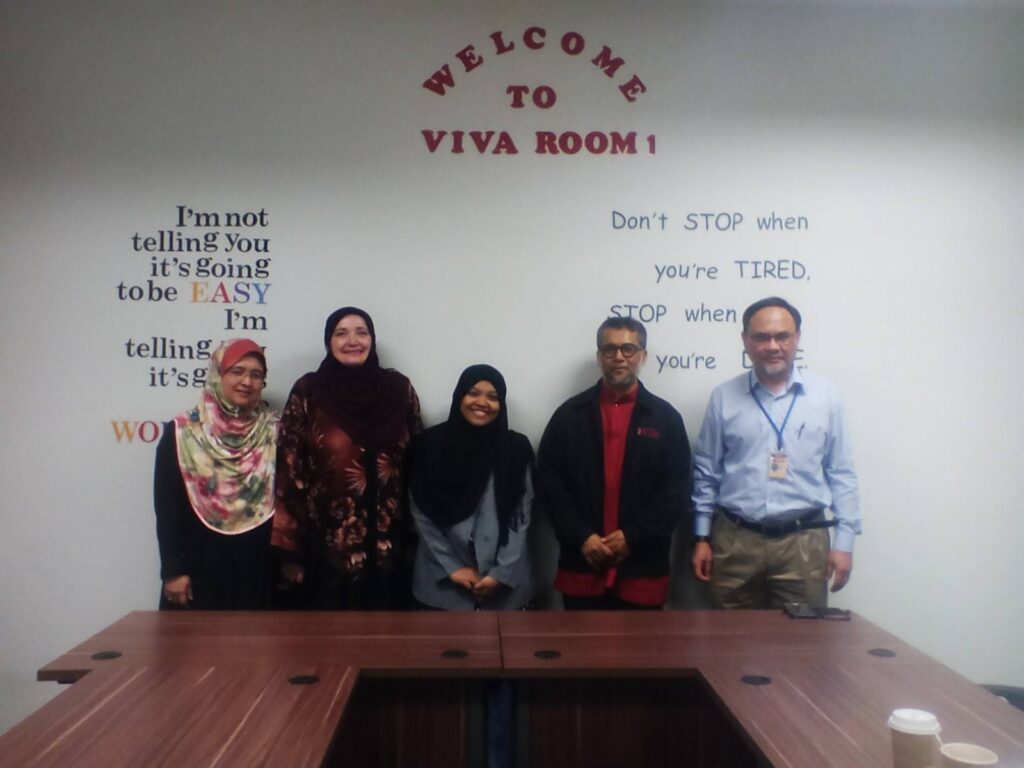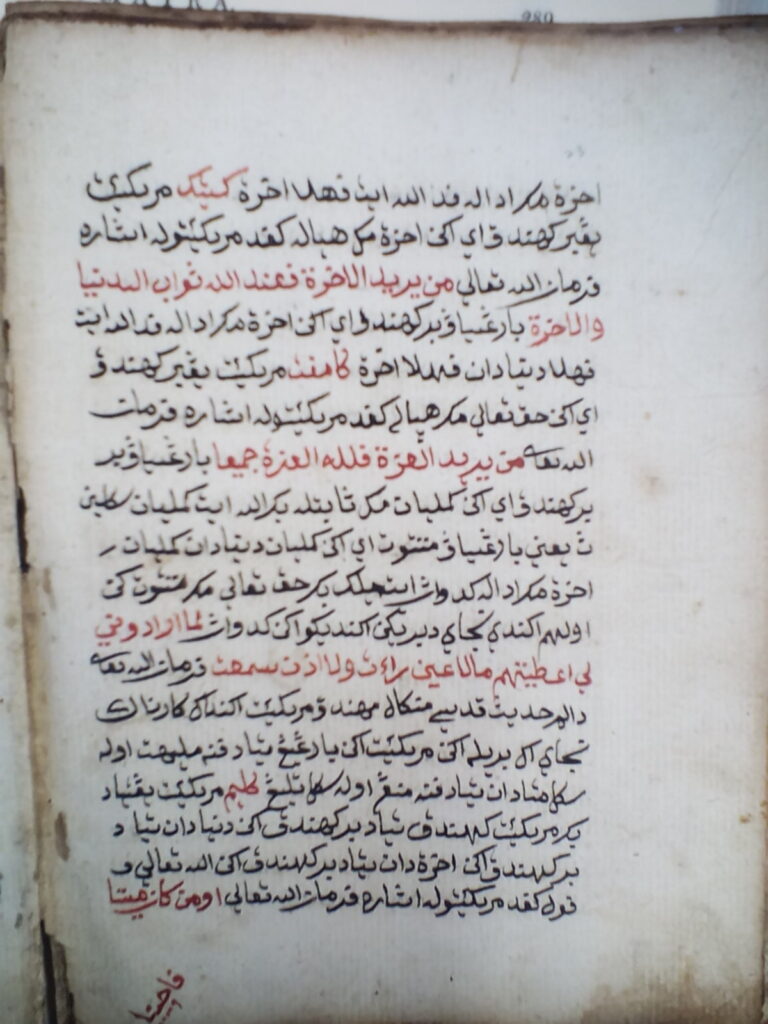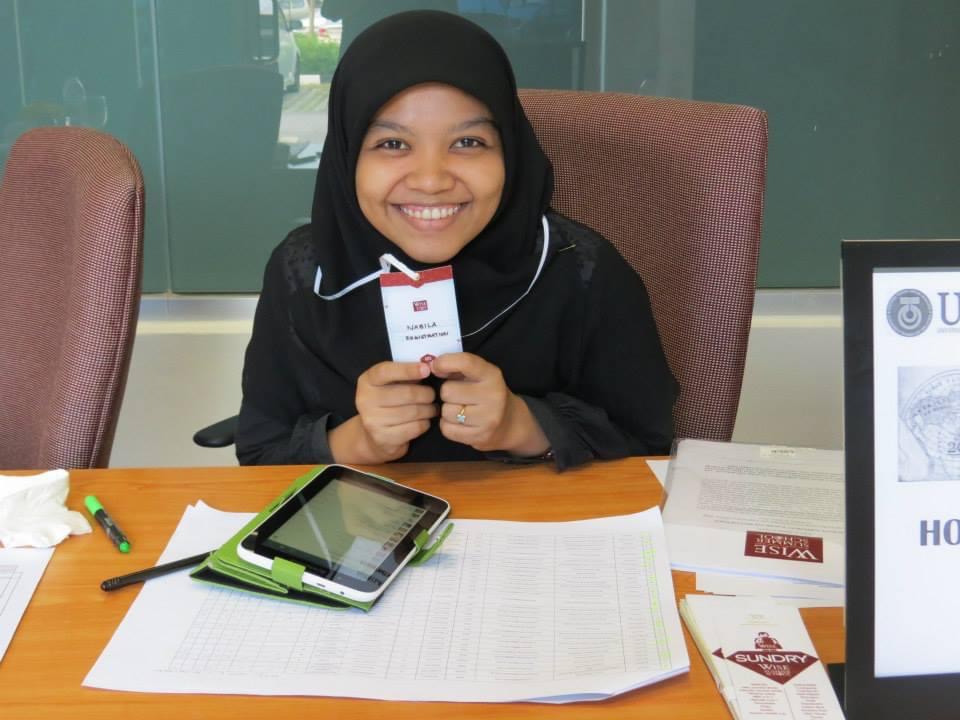By Nabila Yasmin
MPhil at RZS-CASIS (2013-2016)
Lecturer at UIN Sumatera Utara Medan, Indonesia
Bismillāhirraḥmānirraḥīm, Alḥamdulillāhi rabb al-‘ālamīn, Allahummā ṣalli ‘alā sayyidinā Muḥammad.
The story of my intellectual journey to CASIS and finally registering as an official student was quiteintriguing. Beforehand, I had zero information about CASIS. Upon my undergraduate graduation, I had been searching master degree programs to further my studies when I finally came across CASIS on the website. In November 2011, I inquired for further information regarding the program offered, but due to some circumstances, I did not get any reply until the beginning of 2013. It was then that Assoc. Prof. Dr Khalif Muammar A. Harris, the current Director of CASIS who served as Coordinator of Academic Affairs at that time, addressed my questions and suggested I prepare the registration requirements for the M.Phil. application. To cut a long story short, I was officially registered as a full-time student at CASIS in September 2013. What made CASIS stand out as the program I wanted to attend was its exceptionally interesting courses in Islamic Thought and Civilization. In discovering my pathway to CASIS, I felt a connection with what Rumi wisely said: “what you seek, is seeking you.” In the end, not only did I discover the most excellent place for seeking knowledge but Allah also provided me with the best teachers. Alḥamdulillāh bi ni‘matihi tātimmu al-ṣāliḥāt.

If I were to describe my experiences at CASIS in one word, it would be: meaningful. Being a student of knowledge at CASIS was another form of rizq (provision) I was blessed with, which I never could imagine. There are so many experiences that I carry with me until now from my time at CASIS. As I aspired to strengthen my understanding of dīn (the religion)in a comprehensive way and to hone my research skills in Islamic Thought and Civilization, CASIS provided me that opportunity by having many in-depth and structured classes including prerequisites subjects like Arabic, ‘Aqīdah (creed) and Sharīah; compulsory subjects like Worldview and Epistemic Frameworks, Islamic Philosophy of Science, Qur’an and Hadith, and Decolonisation and Islamisation; as well as elective subjects like Islamic Economic Thought and Institution, Islam and World History, Major Muslim Scientists, Tasawwuf in Islamic Tradition, etc.). Additionally, I was able to partake in other academic student activities like collaborative learning and student luncheons. Those courses taught by our teachers within the ambit of the worldview of Islam had a major influence on my understanding of dīn. This is the place where I acquired a clear intellectual map that guides the course of this life, grasped a profound understanding of Islām and learnt how to think and act properly, in a balanced way. To add, I also benefited immensely from the discussions led by our knowledgeable seniors at CASIS during collaborative learning sessions or student luncheons. As a first-year student at that time, I found the collaborative learning sessions beneficial since they helped us enhance our understanding of the ideas conveyed by our teachers in the class. As CASIS students came from various backgrounds, diverse discussions frequently took place during these sessions. On top of that, I also noticed the uniqueness in the knowledge culture at CASIS, where the students were not only trained to have grounding in the Islamic intellectual tradition but also in the other great world civilizations. Hence, it was quite appealing to see a student, despite their background from engineering, math, or social studies, being able to read Arabic classical texts; and likewise, the student with Islamic Studies background being used to studying the major works of western civilization. In this sense, CASIS is such a warm place for curious souls.

To me, all courses offered at CASIS were fascinating. While studying at CASIS, I have been exposed to the primary sources in any of the subjects offered. For instance, in Research Methodology class, our class session sometime took place in the ISTAC library where Dr. Syams introduced us to the authoritative works of scholars in Islamic intellectual tradition. In another instance I remember in Prof. Zainiy’s class, he selected one of the works of Nūr al-Dīn al-Rānirī to be read and discussed in the class. To me, it was a priceless learning experience for the first time to read the ideas of a scholar directly from the makhtutat (manuscripts) despite coming from the Aqidah and Philosophy background during my undergraduate. In the beginning, attending CASIS courses seemed daunting because we full-time student had classes almost every day even on weekends. However, I then realized that spending the time in the circle of seeking knowledge has been a constant source of happiness which I must take advantage of. Moreover, I also noticed that most of the students who came to study at CASIS were true murīdīn who have sincere intentions to devote themselves to the journey of seeking knowledge even during challenging socio-economic circumstances. Ultimately, all the courses I took helped me in elaborating a stable conceptual framework that enabled me to properly think and write my thesis.
If i were to be honest, before joining CASIS, I had little acquaintance with the ideas and works of Tan Sri Prof. Dr. Syed Muhammad Naquib al-Attas. If I can recall, the very first book that I read of Prof al-Attas’ works was The Mysticism of Hamzah Fansuri, a book that I discovered in the private library collection and museum of Ali Hasjmy, Banda Aceh. (To me now, this seems odd because I should have started with Risalah untuk Kaum Muslimin or Islam and Secularism first before anything else.) At that time, I still could not relate the issues that was highlighted in the book but I did learn the way Prof al-Attas presented and arranged the ideas in the book. After attending some classes (prerequisite, compulsory and elective ones) plus attending the very meaningful Saturday Night Lecture Series by Tan Sri Prof. Dr. Syed Naquib Muhammad al-Attas, I eventually made sense of issues that Prof al-Attas discussed in the Mysticism of Hamzah Fanṣūrī that the greatest evidence of the Islamization process manifested in the work of scholars such as Hamzah Fanṣūrī, reflecting the changes of ideas in the worldview of the Malay people centered around a different conception of Being from what they had perceived in the past before the coming of Islam. This book had undoubtedly established the important framework under the ambit of the worldview of Islam on how to examine the history of ideas and the history of Islamization in this region properly. As Prof al Attas suggests, the general theory of the Islamization of the Malay-Indonesian Archipelago is based chiefly on the history of ideas as seen through the changing concepts of key terms in the Malay language in the 10th AH/16th AD and 11th AH/17th AD centuries. These new concepts were reflected in the works of the Malay renowned scholars during those times.
Reading the work of Prof al-Attas on Malay scholars like Ḥamzah Fansūrī and Nūr al-Dīn al-Rānīrī has encouraged me to further explore the works of Malay scholars right from the source (i.e. manuscripts). I therefore decided to work on a thesis examining the kitab Mi‘rāj al-Sālikīn to look into the intellectual tradition in 19th century Aceh, especially in terms of the intellectual history of taṣawwuf. The thesis aims to present Mi‘rāj al-Sālikīn as the source of history of tasawwuf in Acheh during the 19th century and to examine the teaching of tasawwuf of Muḥammad Khaṭīb Langgīn. Muḥammad Khaṭīb Langgīn was one of the prominent scholars of Acheh who lived in the reign of Sultan ‘Alaidīn Sulaymān Ali Iskandar Shah (1251-1273 AH/1836-1857 AD). The research reveals that Mi‘rāj al-Sālikīn was an important book in 19th century Acheh as it was used as a reference book in the Shaṭṭāriyyah Order and with regards to the doctrine of tasawwuf. Muḥammad Khaṭib Langgīn stated that the higher metaphysical discussion, i.e on ma’rifat, was already highlighted during his time scarcely. He, therefore, was so heedful in elaborating his teachings on tasawwuf to his murīdīn. Other than that, Mi‘rāj al-Sālikīn also provided the information regarding the genealogy (silsilah) of ṭarīqat Shaṭṭāriyah in 19th century Acheh. This silsilah proved that the authority of knowledge around that time was still well preserved. In nutshell, the process of islamization and the intellectual tradition continue even in a different environment and time.

Another significant experience at CASIS was volunteering. As CASIS regularly held events like workshops, conferences, public lectures, and Saturday Night Lectures, the students of CASIS were encouraged to be involved as volunteers at such events. I was grateful to have been involved as volunteer in so many insightful events at CASIS such as WISE Summer School 2014, Scholarly Dialogues with Sh. Hamzah Yusuf and Prof. Dr. Salim al-Hassani, and a “Seminar & Workshop on the Astrolabe: Its History and Application,” and many more. CASIS really connected us to meet and listen to some of the most amazing scholars from all over the world. The most memorable volunteering experience, however, was fortnightly CASIS Saturday Night Lecture Series (SNL) by Tan Sri Prof Dr Syed Muhammad Naquib al-Attas. We were all given roles and responsibilities in order to make sure SNL ran smoothly, and all students voluntarily helped one another before, during and after SNL. Volunteering is actually about how to act and contribute sincerely because the foundation of volunteering is sincerity itself; and this kind of spirit has been instilled in us by our teachers at CASIS.
During the launch Prof. Al-Attas’ latest book, On Justice and the Nature of Man, 2016.
Above all, the sincerity of the teachers at CASIS is what I most appreciate. They are always generous with their wisdom and I learnt the meaning of what a true teacher is from them. They not only transferred knowledge, but also disciplined the souls of their students. It is a privilege to have met and studied under these authoritative teachers with their respective expertise. From Prof Wan, I learnt the adab toward self and importance of having the correct framework in thinking; from Prof Zainiy, I learnt the adab toward muslim scholars and their works; from Prof Tatiana, I learnt the adab toward history; from Dr. Khalif, I learnt the adab toward sharī‘ah; from Dr. Wan Suhaimi, I learnt the adab toward aqīdah; from Dr. Syamsuddin and Dr. Sulaiman, I learnt the adab toward language; and from Dr. Adi, I learnt the adab toward the Earth. We were blessed to have been in their classes where their love for knowledge and wisdom not only rubbed off on us but also illuminated our hearts.
To add, it was also another form of rizq to have met friends of knowledge from various countries at CASIS, who were all helpful and generous. I was very much indebted to the generosity of sister Idayu, sister Hajar and sister Wardah in my early days at CASIS, and to the kindness of CASIS staff like Puan Rashida and Puan Sharifah Fadzlina who were always there to help with administrative matters. In short, CASIS is such a welcoming community that provides a kind environment; especially for international student like me, CASIS is really like a home away from home. These kinds of experiences are something that I carry with me until now as a lecturer and researcher in Indonesia.
I am currently teaching at UIN Sumatera Utara Medan. Among the subjects I teach are: Muslim Historiography, Islamic History and Civilization, History of Islamic Library, and Research Methodology. Since June 2021, I have been requested by Dr. Muhammad Arifin Ismail, MA, M.Phil to teach the Worldview of Islam to students of Professional Tahfidz Program at ISTAID (Islamic Thought and Information for Da’wah) and also lead ISTAID weekly discussion sessions on Islam and Secularism followed by students from various universities in Medan. The participants are intellectually curious to delve into understanding religious thought and civilization.
Lastly, I would like to take this opportunity to express my gratitude to all of our dearest teachers who have been teaching me the greatness of this dīn: Professor Dr. Wan Mohd Nor Wan Daud, Professor Dr. Muhammad Zainiy Uthman, Associate Professor Dr. Khalif Muammar A. Harris, Professor Dr. Tatiana A. Denisova, Associate Professor Dr. Wan Suhaimi Wan Abdullah, Dr. Syamsuddin Arif, Dr. Suleiman Mohammed Hussein Boayo and Dr. Adi Setia Mohd Dom. Barakallāhu fīkum.

Nabila Yasmin obtained her B.A in Aqidah and Philosophy from UIN Ar Raniry, Banda Aceh, Indonesia (2011) and later completed her Master of Philosophy in 2017 from CASIS, UTM with thesis entitled “Taṣawwuf Tradition in 19th Century of Aceh with Special Reference to Kitāb Mi’rāj al-Sālikīn.” She is currently working as lecturer and researcher at Department of Islamic History and Civilization, Faculty of Social Science, UIN Sumatera Utara Medan, Indonesia.
